5 reasons to link blockchain and healthcare
Blockchain and healthcare, when unity is strength ...
"By giving more control to patients, blockchain-based solutions can facilitate collaboration and restore trust between patients and healthcare practitioners or hospitals. Professionals, in turn, will have more of the tools they need to save lives." [Le Point article, 2021]
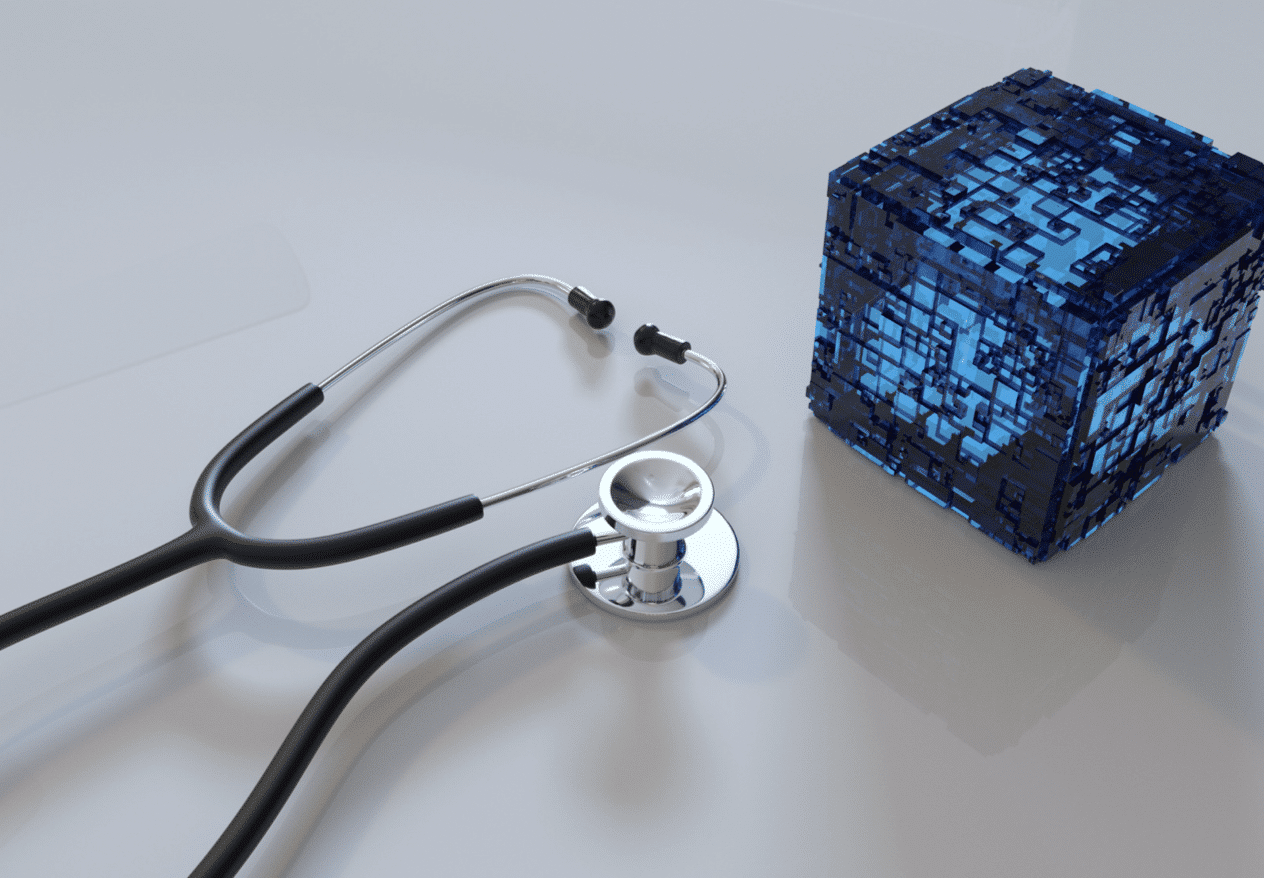
The concept of blockchain, in general, is an incredible and quite revolutionary tool, allowing data to be shared in a secure, decentralized way and with all the speed that can be expected.
However, it is easy to list all the problems that can affect health and patient data.
Data leakage, lack of time for healthcare staff to collect this information, and above all, processing of this information that could be optimized for the benefit of medical progress.
So why not combine blockchain and health? Why not use this tool to provide long-term solutions?
Health is a fundamental issue that concerns us all.
During the last three years, we have experienced events that we would never have expected. And we have also seen the limits of our systems.
Beyond these recent events, we must also see the problem in its entirety.
Can we say today that medical and patient data are managed and used in an optimal way?
Are they secure against the indecent number of hacks in healthcare facilities?
Regardless, accepting more interest in blockchain and all of its functionality for the benefit of healthcare and medical research doesn't seem to be so foolish.
For the most reluctant who consider that blockchain and health are not compatible, here is a first argument that could perhaps change the deal: we have this tools at our disposal, the blockchain, why not try to use it, with all the precautions that must be attached to it, in order to solve certain problems?
This is the bet taken by many projects that are being built in recent years, such as Galeon.
Blockchain and healthcare can be completely compatible and will change the way we approach health.
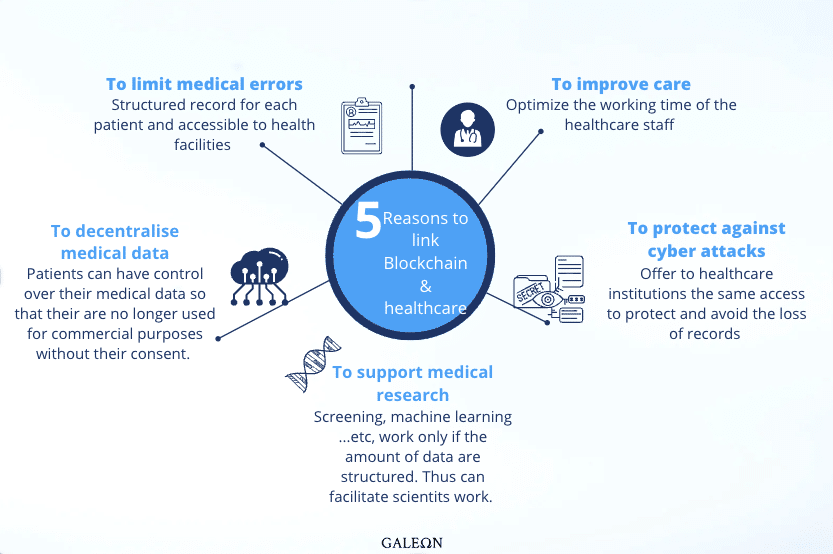
1/ Blockchain and healthcare to limit medical errors
This problem is much more recurrent than it seems.
One of the major reasons being the lack of data regarding the history of patients.
Statistics exist, but it is difficult to give an exact number.
Of course, with what can be found on the Internet, one must take a step back.
Not all medical errors are related to lack of information or misinterpretation of data.
Nevertheless, it is certain that mistakes are made for these reasons.
With all the consequences, you can imagine, that this can lead to: bad management, unjustified acts...etc.
In which way blockchain associated to healthcare could be the solution?
Let's imagine that we use this tool to maintain, for each patient, a structured file with all his history, allergies and other pathologies.
Let's go even further in this idea, by creating a medical file that can be visible to any structure and health professional.
Do you see what is coming?
In France, we have seen the creation of the computerised medical record (DPI = EMR). The latter is supposed to be able to accompany an individual throughout his life as a patient.
Nevertheless, and this will be the subject of the second point, the DPI as it is called, is a solution that only works in an environment where human and financial means are present. That means, not in every medical structure.

2/ Optimizing patient care
If we take the example of hospitals in France, it is certain that they do not all benefit from the same subsidies or the same financial aid.
They are not all managed in the same way and therefore cannot provide identical care and working conditions.
Will a health professional take the time to fill out a concise file with all the necessary information before each treatment? Sometimes.
However, most of the time, this task is relegated to the background in emergency situations for example.
The problem must also be seen from the point of view of the health personnel who waste precious time filling out a bunch of administrative files to justify this or that procedure.
However, this time should be reserved for other things and should not encroach on the rest hours of the nursing staff.
This problem also stems from the fact that information does not circulate between one structure or another, or from one doctor to another.
A structured file within the blockchain would therefore allow :
- facilitate the communication of data
- ensure optimal patient care
- reduce stress for health care personnel.
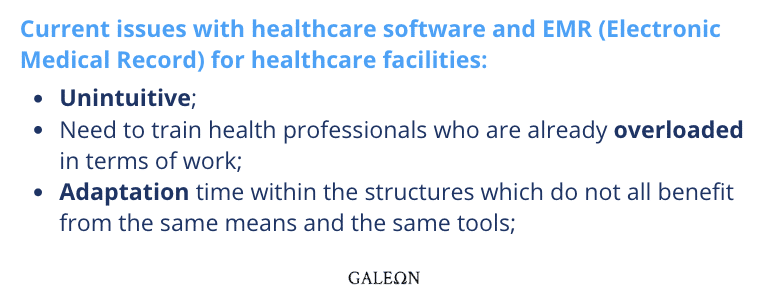
Buy your first crypto easily with Galeon
3/ Decentralized medical data
Another point that can be relayed with the current events is that of data management and their protection.
With the reform on data protection, the individual is supposed to be able to give his consent on the way his personal data are used.
Efforts have been made on the part of companies, however, this data remains in the hands of centralized entities.
On the contrary, the basic idea behind blockchain is to build a decentralized environment.
In other words, there is no intermediary to process this or that information. Everything is done via a solid and secure technology using smart contracts.
Regarding health and personal data, the most striking example in our daily lives is undoubtedly that of connected objects.
IoT (Internet of Things) refers to all those objects that calculate, measure and collect your health data such as your heart rate, your weight, the number of your steps...etc.
What we see as a user are global and daily analyses, allowing us to take stock of our health status, for example.
But as you can imagine, the companies that market these devices are also very keen on this information. Of course, you can agree on how you want to share it, but that doesn't stop it from circulating.
Connected objects and other applications use the Internet to function.
So they go through servers and other intermediaries.
With the blockchain, each element, even the smallest, is coded. Therefore, a cryptographic key is required for each of these data.
Thus, not only are the data protected from a use that would go against our consent, but also from possible hacking.
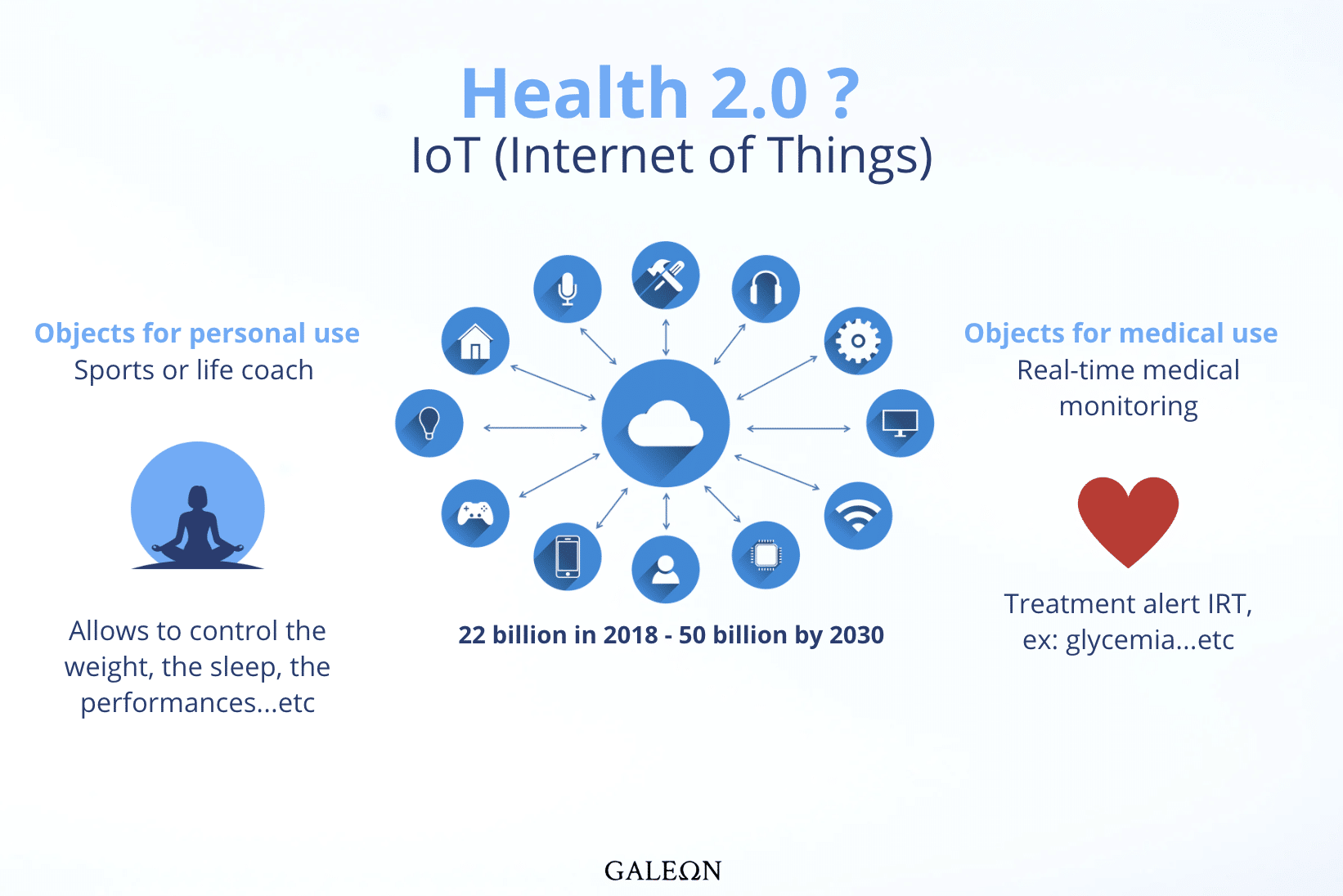
4/ Understanding cyber attacks on healthcare institutions
As we said earlier, with blockchain, the organization and processing of data is done in a decentralized way.
There is therefore, a priori, no entity responsible for managing this data.
As we have seen in recent weeks, hacking has had serious consequences for all healthcare structures.
In 2021, the French National Agency for Information Systems Security reported an average of 1 attack per week in a French healthcare institution.
Knowing that only 7% of attacks were listed.
However, that same year, the ANS (Digital Health Agency) reported a total of 730 cyberattacks in all healthcare institutions. It also underlined the fact that this figure has doubled since 2020.
Beyond these numbers and the security aspect, this data is essential for professionals, especially in terms of patient care.
How can we provide emergency care when we don't have the basic data, and what's more, the data necessary for the patient's survival?
Of course, this is an extreme example and hospitals cannot be blamed.
Again, not all structures have the same tools and the same means of protection.
Blockchain would therefore be a long-term solution to ensure equal operation and care, regardless of the institution.
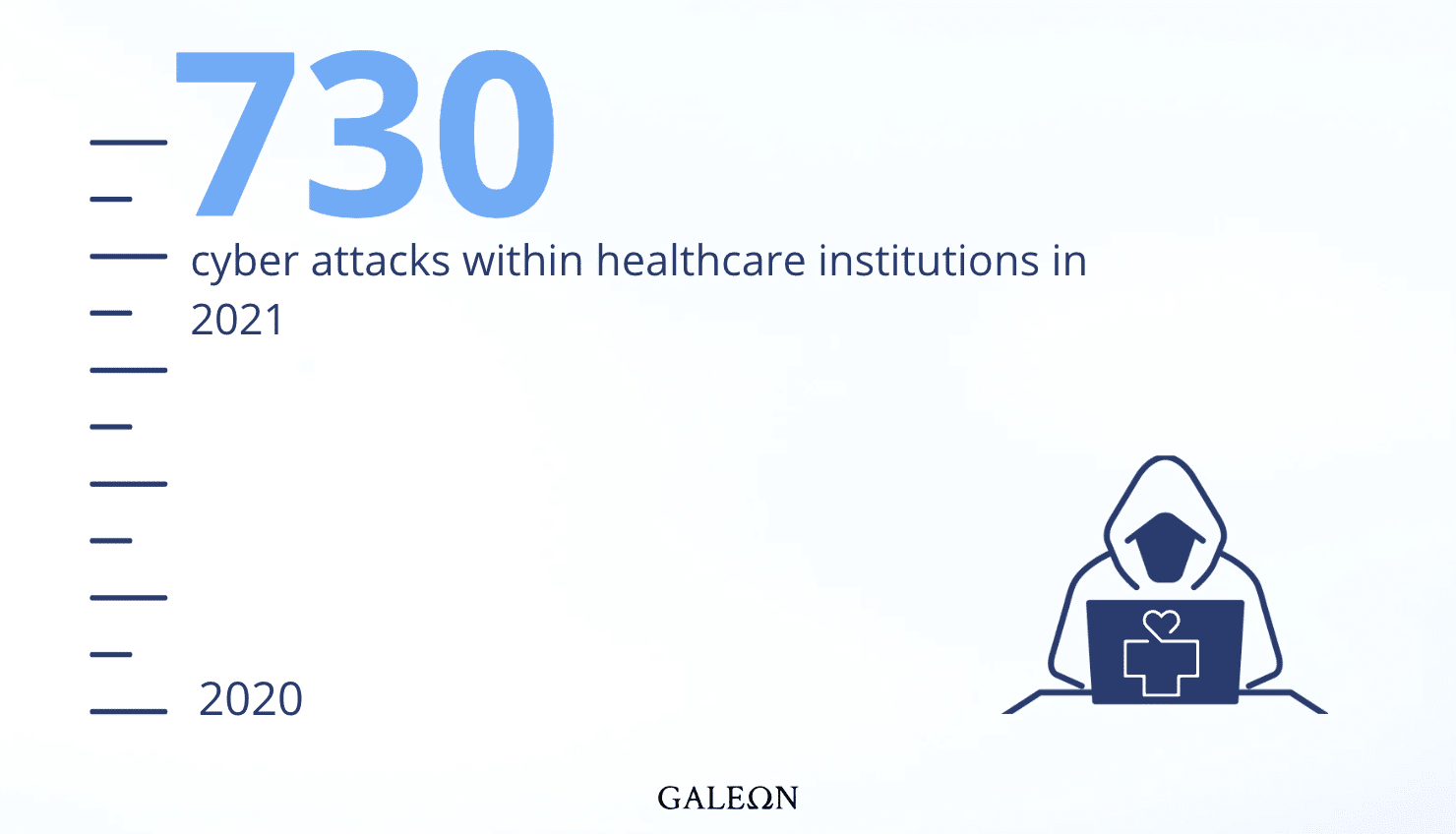
5/ Improving medical research using blockchain and healthcare
How could blockchain help medical research?
Today, data collected and used for research is needed more than ever.
And just as well, there is plenty of it!
More and more data are being collected, without necessarily being pre-selected, or at least, classified.
And once these data are in the hands of researchers and other professionals, they must all be analyzed and sorted.
The studies that are then published are the result of many hours of work.
Imagine a person responsible for a hundred thousand pieces of data, having to sort out what is essential and what is not.
The human brain is capable of many things, just like a computer, but with its limitations.
The blockchain technology allows to process a large amount of data in a very short time.
This means no more time-consuming work and lost hours for these researchers.
And you will agree, medicine and science cannot evolve without research.
There are a number of arguments to confirm the usefulness of blockchain in the health field.
5/ Improving medical research using blockchain and healthcare
How could blockchain help medical research?
Today, data collected and used for research is needed more than ever.
And just as well, there is plenty of it!
More and more data are being collected, without necessarily being pre-selected, or at least, classified.
And once these data are in the hands of researchers and other professionals, they must all be analyzed and sorted.
The studies that are then published are the result of many hours of work.
Imagine a person responsible for a hundred thousand pieces of data, having to sort out what is essential and what is not.
The human brain is capable of many things, just like a computer, but with its limitations.
The blockchain technology allows to process a large amount of data in a very short time.
This means no more time-consuming work and lost hours for these researchers.
And you will agree, medicine and science cannot evolve without research.
There are a number of arguments to confirm the usefulness of blockchain in the health field.
We have decided to mention these 5 precisely because they are directly related to the Galeon project: to enable the sharing of patient data between healthcare institutions in order to improve patient care.
And let's not forget the research aspect, since the patient decides if he or she wants to share his or her data for the benefit of a particular medical research.
Follow us on the networks to discover the project.
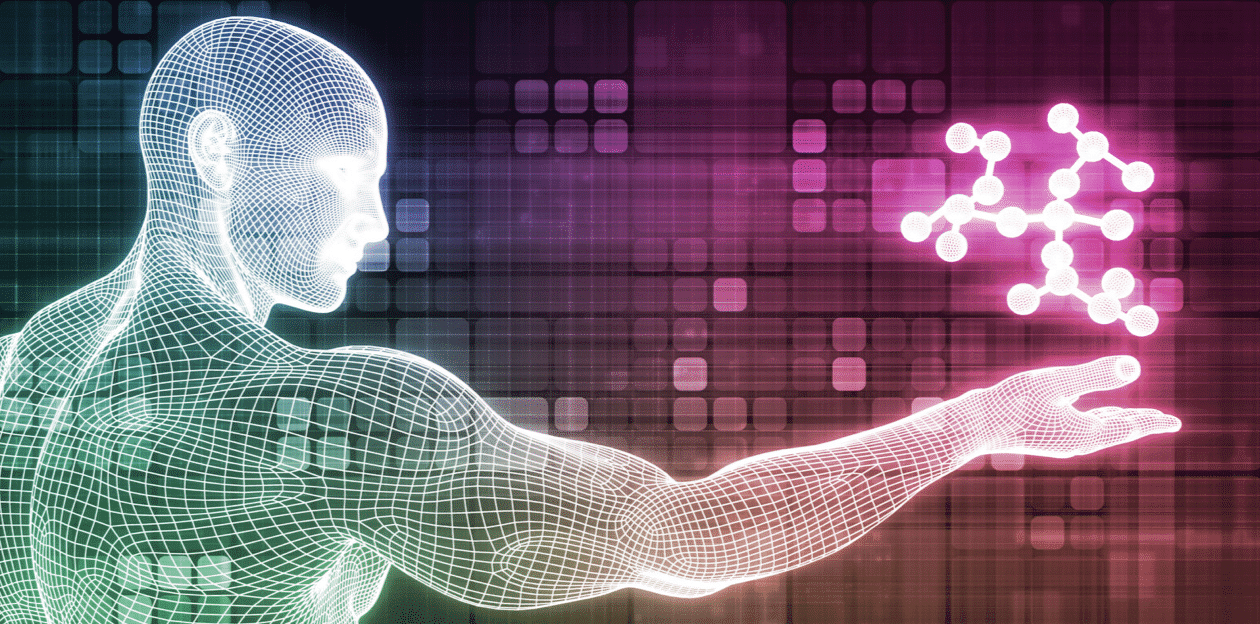
Want to buy your 1st crypto easily?
Invest on the Galeon crypto by credit card
